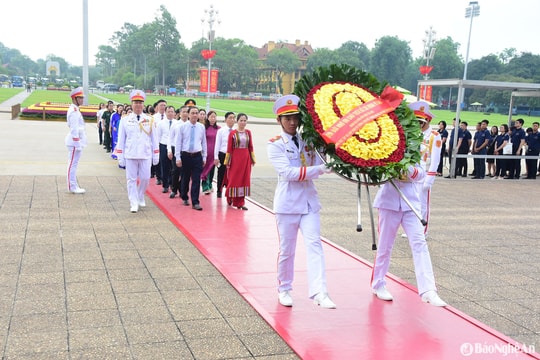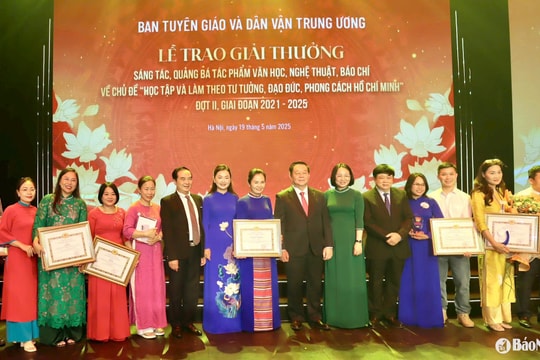President Ho Chi Minh
Founder and trainer of the Communist Party of Vietnam

SUMMARY OF WORK COURSES
- June 5, 1911: He left Nha Rong port to find a way to save the country.
- 1912-1917: With the name Nguyen Tat Thanh, he visited many countries in Asia, Europe, America, and Africa, living among the working people.
- 1917: Returned to France from England, active in the overseas Vietnamese movement and the French workers' movement
- 1919: Taking the name Nguyen Ai Quoc, on behalf of Vietnamese patriots in France, he sent to the Versailles Conference a petition demanding freedom for the Vietnamese people and also freedom for the people of the colonies.
- December 1920: Nguyen Ai Quoc attended the 18th Congress of the French Socialist Party and voted in favor of the Party joining the Third International (Communist International), becoming one of the founders of the French Communist Party.
- 1921: Participated in founding the Union of French Colonial Peoples
- 1922: Publisher of the newspaper "Le Paria"
- June 1923: Nguyen Ai Quoc moved from France to the Soviet Union and worked at the Communist International.
- October 1923: At the first International Peasants' Conference, Nguyen Ai Quoc was elected to the International Peasants' Council and was the only representative of colonial peasants elected to the Presidium of the Council.
- June and July 1924: Attended the 5th Congress of the Communist International, the 4th International Youth Congress, and the International Congress of Red Trade Unions.
- November 1924: He arrived in Guangzhou (China) as a member of the Communist International's Eastern Committee and a member of the International Peasants' Presidium.
- June 1925: He founded the Vietnam Revolutionary Youth Association, directly opened training classes for revolutionary cadres, published the weekly newspaper "Thanh Nien", the first revolutionary newspaper of Vietnam to spread Marxism-Leninism to Vietnam, preparing for the establishment of the Communist Party of Vietnam. Nguyen Ai Quoc's lectures at the training classes were compiled and printed into the book "Duong Kach Menh" - an important theoretical document that laid the ideological foundation for the Vietnamese revolutionary path.
- May 1927: Nguyen Ai Quoc left Guangzhou for Moscow (Soviet Union), from the Soviet Union to France, then to Belgium to attend the General Assembly of the Anti-Imperialist League, then to Germany, Italy and from here to Asia.
- 7/1928 - 11/1929: Nguyen Ai Quoc worked in the patriotic overseas Vietnamese movement in Siam (Thailand), continuing to prepare for the birth of the Communist Party of Vietnam.
- From February 3 to 7, 1930: He chaired the Party's founding conference held in Kowloon (Hong Kong, China). The conference agreed on the unification of the Party and approved the Party's name as the Communist Party of Vietnam. The conference approved the Party's official documents: Brief Platform, Brief Strategy, Brief Charter... drafted by him.
- June 1931: He was arrested by the British government in Hong Kong. At the end of 1932, he was released.
- 1934-1938: Nguyen Ai Quoc studied at the Institute for Research on National and Colonial Issues in Moscow (Soviet Union). Persisting on the path determined for the Vietnamese revolution, he continued to monitor and direct the revolutionary movement in the country.
- October 1938: He left the Soviet Union for China, contacted the Party organization and prepared to return home.
- January 28, 1941: Nguyen Ai Quoc returned home after more than 30 years away from the Fatherland.
- May 1941: He returned to the country to convene the 8th Conference of the Central Executive Committee of the Indochinese Communist Party, established the "Vietnam Independence League" (Viet Minh), organized armed liberation forces, built bases, led people to partial uprisings and the General Uprising to seize power throughout the country.
- 8/1942: Taking the name Ho Chi Minh, he represented the Viet Minh Front and the Vietnam Branch of the International Anti-Aggression Association to China to seek international alliances and coordinate actions against fascism on the Pacific battlefield. He was arrested by Chiang Kai-shek's local government and imprisoned in the prisons of Guangxi province. During his 1 year and 14 days in prison, he wrote the book of poems "Prison Diary" with 133 poems in Chinese characters.
- 9/1943: The person was released
- September 1944: He returned to Pac Bo (Cao Bang)
- December 1944: He directed the establishment of the Vietnam Propaganda Liberation Army, the predecessor of the Vietnam People's Army.
- May 1945: He left Cao Bang for Tan Trao (Tuyen Quang)
- August 1945: At his request, the Party's National Conference and the National Congress met to decide on a General Uprising. The National Congress elected the Vietnam National Liberation Committee (i.e. the Provisional Government) with Ho Chi Minh as Chairman. He and the Party Central Committee led the people to successfully rise up and seize power.
- September 2, 1945: At Ba Dinh Square, he read the "Declaration of Independence" announcing the establishment of the Democratic Republic of Vietnam.
- January 1, 1946: The provisional coalition government was established with Ho Chi Minh as President and Minister of Foreign Affairs.
- January 1946: The 1st National Assembly elected him as President of the Democratic Republic of Vietnam.
- March 2, 1946: The coalition resistance government was established with Ho Chi Minh as President.
- November 3, 1946: President Ho Chi Minh was assigned by the National Assembly to form a new Government with him as President and Prime Minister (from November 1946 to September 1955) and Minister of Foreign Affairs (from November 1946 to 1947).
- December 19, 1946: He issued the Call for National Resistance against the French colonialists to protect the independence and freedom of the Fatherland.
- 1951: At the 2nd National Party Congress (the Party publicly took the name of the Vietnam Workers' Party), he was elected Chairman of the Party Central Committee. Under the leadership of the Party Central Committee, headed by President Ho Chi Minh, the resistance war of the Vietnamese people against the French colonialists achieved great victory, ending with the great victory of Dien Bien Phu (May 7, 1954).
- 1955: The Party Central Committee and President Ho Chi Minh set out two strategic tasks for the Vietnamese revolution: to carry out the socialist revolution and build socialism in the North, while at the same time fighting to liberate the South, unify the country, and complete the people's national democratic revolution throughout the country.
- October 1956: At the 10th expanded Central Conference (2nd term), President Ho Chi Minh was elected Party Chairman and General Secretary of the Party.
- September 1960: At the 3rd Party Congress, he was re-elected as Chairman of the Central Executive Committee of the Vietnam Workers' Party.
- 7/1960 - 9/1969: Elected President of the Democratic Republic of Vietnam at the first session of the 2nd and 3rd National Assembly
- September 2, 1969: President Ho Chi Minh passed away in Hanoi
- 1990: On the occasion of the 100th anniversary of his birth, President Ho Chi Minh was honored by the United Nations Educational, Scientific and Cultural Organization (UNESCO) as a national liberation hero and outstanding cultural figure.





.jpg)

